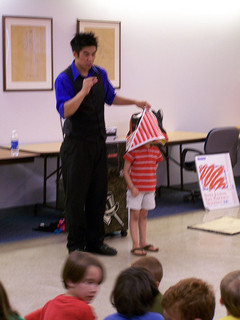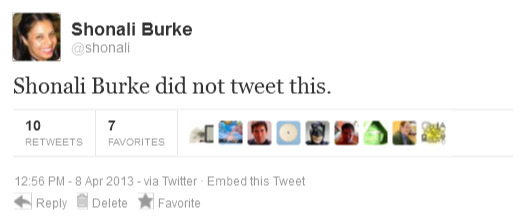I have a confession to make:
I’m not 100% in love with social media.
Don’t get me wrong, social media. The time we have spent together has been great. I love the way you are able to communicate so quickly, so fluidly, so… seamlessly. And I wouldn’t trade the time we’ve had together for the world.
Oh, and we’re not breaking up. I’m not ready to leave you.
But I have noticed that our relationship has begun to change. And I can no longer avoid talking about it, lest you transform into a monster and eat me, as well as anyone else who knows you.
Using social media to lie is unfortunately easy. Here are just a few of the ways people do it.
1. The Fake Facebook Meme
I see this one all the time. It’s really easy to do. Simply find a picture of someone, make up a quote/fact/story, slap it on the bottom of the picture, and post it. Use Photoshop if necessary. Famous people, political stuff and religion statements seem to work best.
Most recently, I saw a meme claiming Coca Cola’s current formula is more addictive than its original formula, in spite of the fact that (admitted by the meme) the original formula contained cocaine.
I’ve never tried cocaine, but I’ll tell you this: I don’t see too many people hitting rock bottom over a soda.
Facebook memes are scary because they can be used to justify almost any fact, are easy to make viral, and are hard to argue with due to the speed with which they are created.
2. Bots
Twitter and Facebook both contain plenty of fake followers. How many is somewhat ambiguous; the account descriptions don’t generally admit they’re fake. Web Pro News states that more than 27% of the top ten Twitter accounts’ followers are fake. According to Forbes, Facebook estimates it has roughly 83 million fake followers.
So we know it’s out there. It’s factual. The question is how many of these bots are creating activity that appears to be real? And that activity matters for a clear and obvious reason: It can affect media and create news. CNN reports based on tweets, as one rather famous news satirist has shown.
So the real question is: Have fake sources been quoted for “real news”?
3. Fake Tweets
Got Photoshop? Then fake tweets are easy to create. But now they’re even easier with Lemme Tweet That For You, which brings fake tweets into realistic looking existence at a faster clip than ever before. Simply type in the name of the person you want to frame, enter the fake tweet, and voila! Fake tweets!
Just as Facebook posts can spread misinformation, fake tweets can spread misinformation as well.
4. Format
I have heard a lot of talk about Twitter’s use as a conversation tool. Yet 140 characters is not often enough space to make an independent statement. This format makes it inevitable that we will not always get the big picture purely from social media. And it’s only reasonable to assume that those without the big picture will paint an incomplete portrait and pass it on via “telephone,” morphing the message over time.
One way this managed to affect me personally occurred during social media week. I was a guest on a panel where the audience was live-tweeting. I was all for it. Audience involvement gets two thumbs up from me. But three times, I was quoted incorrectly. And once, I was quoted without attribution. The quote went viral, thus crediting the tweeter.
5. Omission
What is perhaps most interesting about the concept of social media is that it is SO fast, SO voluminous, and SO impossible to completely track that very important bits of information, essential elements of the truth even, can get lost in the shuffle
So what do we do? Quit using social media?
NO WAY!
Social media is a fantastic tool that has positively benefited the world by opening the lines of communication for so many topics and so many people. Small businesses that wouldn’t have survived otherwise have used it as a tool to successfully find customers. Non-profits have used it to better existence. Individuals have found their voice when they were otherwise silent.
No, our job is to keep social media ethical. Just as Waxing Unlyrical helped lead the way when some of the issues surrounding sponsored blogging arose, leading the way on social media abuse should foster dialogue that allows for better, more ethical business practice and a stronger social media industry.
Our job from here is to acknowledge the potential pitfalls in social media so we can prevent them. That way, we can continue to enjoy the benefits of social media while mitigating its risks.
Images: Derry Public Library via Flickr CC 2.0 and Lemmetweetthatforyou.com (Promotes sharing of site made images)





![[EVENT]: PR Hacks for Small Biz (online)](https://shonaliburke.com/wp-content/uploads/2021/06/FB-Ad-1200x800-01-01-01-Copy-500x383.jpeg)





Even though this kind of $*!t happens, I”d like to think it’s the exception rather than the rule… do you?
Shonali The scary part to me is I don’t know. I am pretty sure that PR pros and social media types at large are not so bad about INITIATING fabrication. But once the fabrication begins, it’s SUPER easy to spread around, even if you are well-intentioned. One false meme, fake tweet, bad news story (i.e. CNN’s Boston coverage) or any other of a myriad of potential misinformation paths and BOOM! The web EXPLODES.
It’s a Molotov cocktail that consists of incredible speed (social media), lower barrier for entry (blogging) and the 24 hours news cycle (cable).
I don’t have a full answer, and as bowden2bowden pointed out, I’m not sure I’m COMPLETELY innocent. I could have very easily RTed something false in my life. But I TRY not to.
And I think it’s worth a dialogue.
Something else that frightens me a bit is the fact there is some fear to speak up and consider it a problem because the journalists I have spoken to and some of the bloggers and social media people I have mentioned it to get defensive. I don’t hold it against that crowd though. They have their offenders, but I’m in marketing myself. If there is a real problem (and I think there is), we should all encourage creating solutions rather than claiming the industry is perfectly fine and there is no harm to be done.
Another thought: if there’s a small problem today, there can be a big one tomorrow.
The initial conversation about this in our community if you ask me is the conversation surrounding Ryan Holliday’s book/stunt. His method was questionable, but the community didn’t respond very maturely, either.
It’s time to admit we have a potential issue and ethically solve it. I personally would like to see a full-scale dialogue without finger-pointing. Oddly enough, blame destroys accountability, because when you blame one person, you fire that person and say, “Well, that’s taken care of.” But again, this is systematic. If we can discuss it honorably without crucifying the industry as a whole OR the minority of people out there who are willing to point out issues, it should (theoretically) turn down the temperature and help us start solving some of these issues. I, as a marketer who tries to be honest, don’t want to work in a problematic atmosphere if I can avoid it.
And I think others who want to be honest probably feel the same way.
There are going to be some heated points over time (“Is it OK to link to someone else as a source without checking THEIR sources?” “Should we require non-digital sources for news?” etc.). I just want to make sure those discussions result in a stronger more honest world.
Of course, feel free to tell me I’m right/wrong/a mixture of the two. :)
I got into an argument with someone on ginidietrich ‘s blog when an article on our Sunday post I had was the fight between the NRA, Fox News and Jim Carrey. The person said hey Jim has over 60% of his 10 mil followers fake or inactive. How can you say he is bigger than the other two? So I ran Fox news and 71% of their 2.5 mil twitter followers are fake or inactive. NRA had only 141k fans. So I ran mine and I had only 2% fake…whew!
If Facebook admits 1 out of 10 are fake shouldn’t they adjust the number claim are active users? I think the number twisting hype bugs me the most. When facebook became the number 2 network for video views 2 years back at 250mil per month it was all over the news. Yet they had 500mil users. So 0.5 views per user per month was something to hype? LOL
Great ost Mr Dan!
Howie Goldfarb ginidietrich Go Howie for having only 2% fakers! It’s nice to have a strong (real) following. :)
It’s interesting to think that fake users would be used for leverage. Most of us look to tie social to something measurable and preferably revenue-related (or at least related in some other fashion to our strategic goals). I have a client whose FB page we built from scratch to about 50,000 and, based on the interactions we have had and the methods we used, we know we have a fairly legit audience, many of whom we can sell to in the future.
Better 50,000 real than 1 million fake!
Thanks Howie!
Great post and very much on topic with much activity today. It, plentiful scams and frauds, is simply a product of the open web. Squash one and another will pop up like a wack-a-mole. I am not one to wag a finger in that I always think of the other three pointing back at me. However your point of fostering dialog and creating more ethical business practices is welcome by me. We will never escape the vanity vail but the cream of the crop will always rise!
bowden2bowden Completely agree. I think there really is something systematic here. I don’t think (most) social media people are bad people any more than I think PR people are just spinsters. But there really is a problem in the system.
And I hope the cream of the crop (Shonali , looking your way here) will rise.
Thanks for the post amigo!